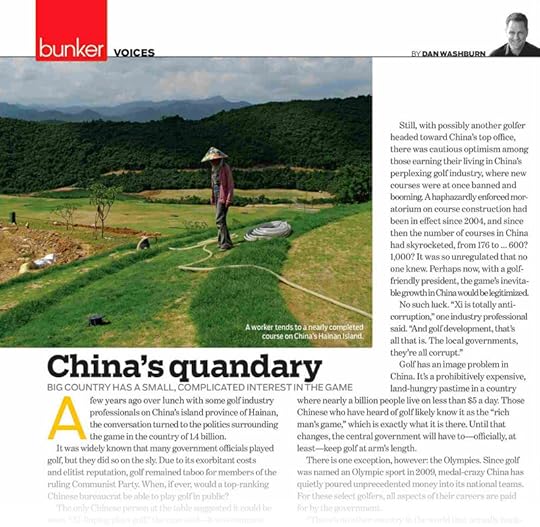Dan Washburn's Blog, page 7
July 27, 2014
Listen: BBC World Service talks to Dan Washburn about China’s ‘forbidden game’ — golf
Listen to BBC’s Paul Henley talk to Dan Washburn below. This interview originally ran on June 21, 2014, as part of BBC World Service’s Weekend show.
Listen: PRI’s ‘The World’ on Forbidden Game and ‘ultimate underdog’ Zhou Xunshu
July 14, 2014
Listen: WNYC’s Leonard Lopate interviews Forbidden Game author Dan Washburn
Read the story at WNYC.
Listen: Jian Ghomeshi interviews Dan Washburn about China’s Forbidden Game
Read the writeup on Q with Jian Ghomeshi.
Read an exclusive Forbidden Game excerpt on Shanghaiist
The $40 million Chinese golf course (that’s now underwater)
It’s been 10 years since the Chinese government made building new golf courses illegal. And, over the course of those 10 years, no country has built more golf courses than China. The reason local officials are willing to skirt Beijing’s ban is simple: money. When land-hungry developments like golf resorts come to town, local governments profit mightily — because, in China, local governments own the land. And the flow of money doesn’t stop once the land deal is settled, either. To keep projects moving, and the “Beijing golf police” at bay, palms repeatedly need to be greased. It can add up.
Of course, there are times when problems don’t get worked out, regardless of how much money gets thrown at them. A prime example was a monster project funded by a billionaire real estate tycoon, one of the richest men in China. He had dreams as big as his bank account, and set his sights on a prime piece of land, a spot so beautiful that it could have been part of a national park. It had everything – steep cliff faces, stunning mountain views from almost every angle and, at the center of it all, a large meandering lake that would bring water into play on nearly every hole. He hired one of the world’s most celebrated golf course architects to draw up a signature design. And he was busy buying up decaying resorts all over the area. He hoped this would be the first of as many as six golf courses he’d build there. Big numbers like this were becoming common in China – everyone was chasing after Mission Hills, the 12-course mega-complex in Guangdong province that Guinness World Records anointed the largest golf facility in the world.
But to the experienced eye of the American project manager overseeing construction, problems lurked at the site from the start. Right where the course’s first three holes would be, there was a well-established village, whose residents also claimed some ownership of various other sections of the course. When the project manager first arrived, he noticed several villagers had begun to build new, taller homes – a sure sign they were trying to score larger relocation settlements. He could tell these villagers were well informed, and canny. They weren’t going down without a fight.
Read the rest on Shanghaiist.
Financial Times review calls Forbidden Game ‘excellent,’ ‘colorful’
In 1995, Zhou Xunshu dropped out of security guard school in the province of Guizhou and made his way south to Guangdong, China’s manufacturing heartland. With almost no money in his pocket, he was following the well-worn tracks of millions of young migrant workers hoping to escape rural poverty.
He got a job working as a security guard at a golf club, one of an estimated 15 courses that existed in China at the time. Still, the athletic young man was not content. He desperately wanted to play golf but faced serious obstacles: he had no money and the club only allowed managers to use the course. “It was like having a delicious piece of meat in your mouth but not being able to eat it,” Zhou tells journalist Dan Washburn, who recounts the story in his excellent book The Forbidden Game.
After several years, a manager takes a risk and allows Zhou to swing an expensive driver. He is soon outdriving everyone at the club. A decade later – and following many trials and tribulations – Zhou in 2008 achieved his dream of becoming a professional golfer, playing a sport that most people in China have never seen.
Zhou is one of three people whose narratives are woven together in Washburn’s colourful account of the rise of golf in China.
Read the rest at The Financial Times.
July 9, 2014
‘China’s Quandary,’ my column in this week’s Golf World magazine
I’ve got a column in the July 7, 2014, issue of Golf World magazine. It’s called “China’s Quandary: Big Country Has a Small, Complicated Interest in the Game,” and unfortunately it’s not available online. You can, however, buy a digital edition on Google Play’s Newsstand for 99 cents.

In the UK’s Literary Review, Jonathan Mirsky calls Forbidden Game ‘vivid’ and ‘revealing’
Jonathan Mirsky writes:
There are two books here. One is about the intricacies and arcana of golf — irons, niblicks, drivers, pars, cuts, and so on. If you are a golf maven, go for it. But the other book is on a wholly different matter: the details and extent of local and high-level Chinese corruption — ‘A China thing’, or ‘That’s China’, as one of Dan Washburn’s main subjects repeats, as if to excuse as well as explain. I know no narrative that surpasses The Forbidden Game in this regard.
Building golf courses has been illegal for many years in China, except for a very recent ruling that permits them on Hainan island alone. But hundreds have been built, saving the bacon of the world’s leading designers as the American market has collapsed. If there is a better example of ‘don’t ask, don’t tell’, as these vast unmistakable tracts spread across the country, I haven’t noticed it. …
The accounts of villagers, promised compensation for the expropriation of their land, which in China ultimately belongs to the government, and subsequently betrayed, are vivid. …
This Literary Review article is not available online, but a digital edition is available for purchase.
July 7, 2014
In enthusiastic review, The Wall Street Journal calls Forbidden Game ‘strikingly original’ and ‘gripping’
Edward Chancellor writes:
Attempts to explain China’s recent history often fall back on statistics showing the country’s breakneck economic growth: how many tons of steel have been produced, how many miles of high-speed rail constructed. The trouble with this approach is that the figures are mind-numbingly large and often dubious, while the social context is overlooked. Dan Washburn has found a strikingly original device to portray recent developments in China: It’s all about golf.
In “The Forbidden Game,” Mr. Washburn, an American journalist who spent several years in Shanghai, tells the story of golf’s progress in the Middle Kingdom through the lives of three protagonists: Zhou, a migrant worker who takes a job as a security guard but strives to become a professional golfer; Wang, a farmer on the tropical island of Hainan—China’s Hawaii—who finds a new vocation as a restaurant owner after his land is given over to a golf course; and Martin, a hard-working and foul-mouthed American golf-course contractor.
“The Forbidden Game” is a tale of material dreams, both the absurdly grandiose and the touchingly individual. They are realized against a backdrop of public corruption and constant battles between Beijing and local governments. Ambitious developments are undertaken at breakneck speed by overweening tycoons; they involve arbitrary land seizures and environmental depredations. In short, this is a tale of modern China.
Read the rest at The Wall Street Journal.
July 1, 2014
Australia’s Business Spectator calls Forbidden Game ‘revealing and fascinating’
Fergus Ryan writes:
In his revealing and fascinating book, Washburn looks at China’s recent development through the lens of a game that was denounced by Chairman Mao as a “sport for millionaires” when the Communists took control in 1949, and was completely banned until 1984.
“Golf is a topic that touches on a lot of issues at the heart of what China’s going through at this stage of its development,” Washburn told China Spectator.
“It’s a barometer for economic growth but it’s also a symbol for the environmental issues the country faces, of the gap between rich and poor that is growing wider everyday. It allows you to talk about the kind of Wild West real estate development that’s happening, and then of course it’s got its fair share of political corruption and intrigue.”
Read the rest here.



